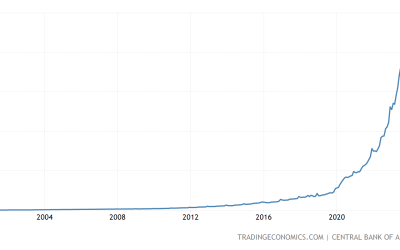In 1936, in his General Theory of Employment, Interest and Money, Lord Keynes unfortunately elevated this method–the emergency measures of the period between 1929 and 1933–to a principle, to a fundamental system of policy. And he justified it by saying, in effect:
“Unemployment is bad. If you want unemployment to disappear you must inflate the currency.”
He realized very well that wage rates can be too high for the market, that is, too high to make it profitable for an employer to increase his work force, thus too high from the point of view of the total working population, for with wage rates imposed by unions above the market only a part of those anxious to earn wages can obtain jobs.
And Keynes said, in effect: “Certainly mass unemployment prolonged year after year, is a very unsatisfactory condition.” But instead of suggesting that wage rates could and should be adjusted to market conditions, he said, in effect: “If one devalues the currency and the workers are not clever enough to realize it, they will not offer resistance against a drop in real wage rates, as long as nominal wage rates remain the same.” In other words, Lord Keynes was saying that if a man gets the same amount of sterling today as he got before the currency was devalued, he will not realize that he is, in fact, now getting less.
In old fashioned language, Keynes proposed cheating the workers. Instead of declaring openly that wage rates must be adjusted to the conditions of the market-because, if they are not, a part of the labor force will inevitably remain unemployed-he said, in effect: “Full employment can be reached only if you have inflation. Cheat the workers.” The most interesting fact, however, is that when his General Theory was published, it was no longer possible to cheat, because people had already become index conscious. But the goal of full employment remained.
What does “full employment” mean? It has to do with the unhampered labor market, which is not manipulated by the unions or by the government. On this market, wage rates for every type of labor tend to reach a point at which everybody who wants a job can get one and every employer can hire as many workers as he needs. If there is an increase in the demand for labor, the wage rate will tend to be greater, and if fewer workers are needed, the wage rate will tend to fall.
The only method by which a “full employment” situation can be brought about is by the maintenance of an unhampered labor market. This is valid for every kind of labor and for every kind of commodity.
What does a businessman do who wants to sell a commodity for five dollars a unit? When he cannot sell it at that price, the technical business expression in the United States is, “the inventory does not move.” But it must move. He cannot retain things because he must buy something new; fashions are changing. So he sells at a lower price. If he cannot sell the merchandise at five dollars, he must sell it at four. If he cannot sell it at four, he must sell it at three. There is no other choice as long as he stays in business. He may suffer losses, but these losses are due to the fact that his anticipation of the market for his product was wrong.
It is the same with the thousands and thousands of young people who come every day from the agricultural districts into the city trying to earn money. It happens so in every industrial nation. In the United States they come to town with the idea that they should get, say, a hundred dollars a week. This may be impossible. So if a man cannot get a job for a hundred dollars a week, he must try to get a job for ninety or eighty dollars, and perhaps even less. But if he were to say-as the unions do–“one hundred dollars a week or nothing,” then he might have to remain unemployed. (Many do not mind being unemployed, because the government pays unemployment benefits–out of special taxes levied on the employers-which are sometimes nearly as high as the wages the man would receive if he were employed.)
Because a certain group of people believes that full employment can be attained only by inflation, inflation is accepted in the United States. But people are discussing the question: Should we have a sound currency with unemployment, or inflation with full employment? This is in fact a very vicious analysis.
To deal with this problem we must raise the question: How can one improve the condition of the workers and of all other groups of the population? The answer is: by maintaining an unhampered labor market and thus achieving full employment. Our dilemma is, shall the market determine wage rates or shall they be determined by union pressure and compulsion? The dilemma is not “shall we have inflation or unemployment?”
This mistaken analysis of the problem is argued in England, in European industrial countries and even in the United States. And some people say: “Now look, even the United States is inflating. Why should we not do it also.”
To these people one should answer first of all: “One of the privileges of a rich man is that he can afford to be foolish much longer than a poor man.” And this is the situation of the United States. The financial policy of the United States is very bad and is getting worse. Perhaps the United States can afford to be foolish a bit longer than some other countries.
The most important thing to remember is that inflation is not an act of God; inflation is not a catastrophe of the elements or a disease that comes like the plague. Inflation is a policy–a deliberate policy of people who resort to inflation because they consider it to be a lesser evil than unemployment. But the fact is that, in the not very long run, inflation does not cure unemployment.
Inflation is a policy. And a policy can be changed. Therefore, there is no reason to give in to inflation. If one regards inflation as an evil, then one has to stop inflating. One has to balance the budget of the government. Of course, public opinion must support this; the intellectuals must help the people to understand. Given the support of public opinion, it is certainly possible for the people’s elected representatives to abandon the policy of inflation.
We must remember that, in the long run, we may all be dead and certainly will be dead. But we should arrange our earthly affairs, for the short run in which we have to live, in the best possible way. And one of the measures necessary for this purpose is to abandon inflationary policies.
This article is serialized from Economic Policy: Thoughts for Today and Tomorrow, a book based on six lectures delivered in Buenos Aires in 1959 on Capitalism, Socialism, Interventionism, Inflation, Foreign Investment, and Politics and Ideas by the great 20th century economist who was too good to receive a Noble Prize: Ludwig von Mises (1881-1973). Copyright 1995 by Bettina Bien Greaves. All rights reserved.




